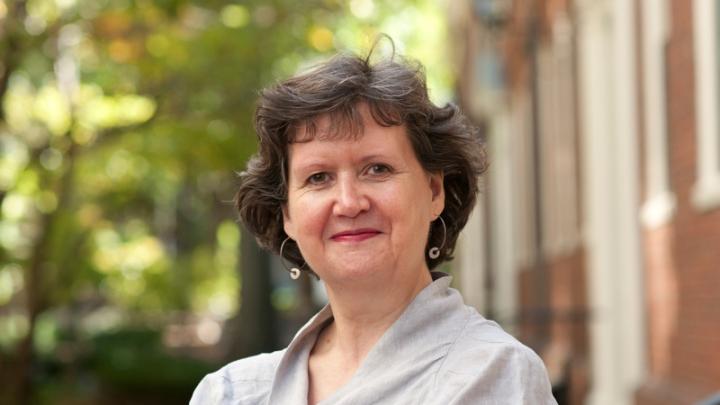Capping a busy December for Harvard’s libraries, including the announcement of a new administrative structure, Helen Shenton this afternoon was named executive director of the new University-wide library system. Shenton, who one year ago was appointed deputy director of the Harvard University Library (HUL, a misnomer for the former unit that managed the Harvard Depository, and a few other centralized services within the vast library system), previously oversaw all of HUL’s programs, systems, and planning.
Management of Harvard’s libraries has long been fragmented, making the coordination of decisions about technology and even acquisitions for the collections increasingly complex. In her new role, Shenton will be responsible for establishing a coordinated management structure for the libraries that balances the need for individual school-based decisions regarding services for their own users with the need for a more harmonized approach to strategic, administrative, and business processes.
“Helen believes strongly, as do I, that academic libraries must not only collect and preserve materials and offer expert guidance to students and faculty alike, but must also be engines of innovation in this exciting time of change,” said University provost Steven E. Hyman, chair of the Harvard Library Board. “I look forward to working closely with Helen as we transform the greatest university library of the last century into the flagship university library of the twenty-first.”
Shenton came to Harvard from the British National Library, where she was the chief steward of the vast historical collections there. She brings expertise in collection management, information technology, human resources, and new building projects. She also has a background in both conservation and digital preservation, activities which, she noted wryly in an earlier interview with this magazine, are not about the past, but instead are “all about the future.”
“My immersion into the Harvard libraries has entailed a great deal of listening and learning. I have been privileged to see some fantastic examples of collaboration between faculty and library staff and of best practices in general,” Shenton said. “One of the most exciting challenges is to harness these ideas and this energy to create a culture of innovation and continuous improvement for the new Harvard Library.”
Shenton was nominated for the position by President Drew Faust, and her appointment was voted by the new library board, which is composed of six permanent members and five rotating members. The permanent members are the provost, the holder of the Pforzheimer University Professorship (traditionally the chair held by the academic director of the University Library), and the deans (or designees) from the following schools: the Faculty of Arts and Sciences (FAS), Harvard Law School (HLS), Harvard Business School (HBS), and Harvard Medical School (HMS).
Serving in these positions are:
- Provost Steven E. Hyman (chair)
- Robert Darnton, Pforzheimer University Professor
- Leslie Kirwan, dean of administration and finance at FAS
- Mary Lee Kennedy, executive director of the Baker Library at HBS
- Richard Mills, executive dean for administration at HMS
- John Palfrey, vice dean, library and information resources at HLS
The rotating members consist of three at-large, tenured faculty members, as well as deans or their designees from the Harvard Kennedy School, the Harvard Graduate School of Design (GSD), Harvard Divinity School, the Harvard Graduate School of Education (HGSE), the Harvard School of Public Health (HSPH), the Harvard School of Engineering and Applied Sciences (SEAS), and the Radcliffe Institute.
Serving in these positions are:
- Mohsen Mostafavi, dean of GSD
- Stuart Shieber, professor of computer science at SEAS
- Nancy Cott, at-large faculty member representing the humanities (and the Pforzheimer Foundation director of the Schlesinger Library at the Radcliffe Institute)
- Isaac Kohane, at-large faculty member representing the sciences (the director of the Countway Library of Medicine)
- William Fisher, at-large faculty member representing the social sciences (the WilmerHale professor of intellectual property law)
The board is charged with reviewing the strategic plans of the Harvard Library and assessing its progress in meeting those plans, reviewing system-wide policies and standards, establishing and making changes to the funding model for the Harvard Library, reviewing and adopting budgets, and exercising oversight of the work undertaken by the Harvard Library executive director.
In other library news, the retirement of Harvard College Librarian Nancy Cline was announced last week; she has served in that position since 1996. Cline will continue to “develop a plan for assessing existing and proposed collaborations for their strategic value to the new organization and its programs, and advise on how the University can more fully realize the benefits of these relationships,” said dean of the Faculty of Arts and Sciences Michael Smith. “The new vision for the Harvard Library we are now embracing, and the profound and positive changes this vision will bring, are,” Smith said, “an important part of her legacy, in keeping with the many advances she has forwarded over her long career here.”









